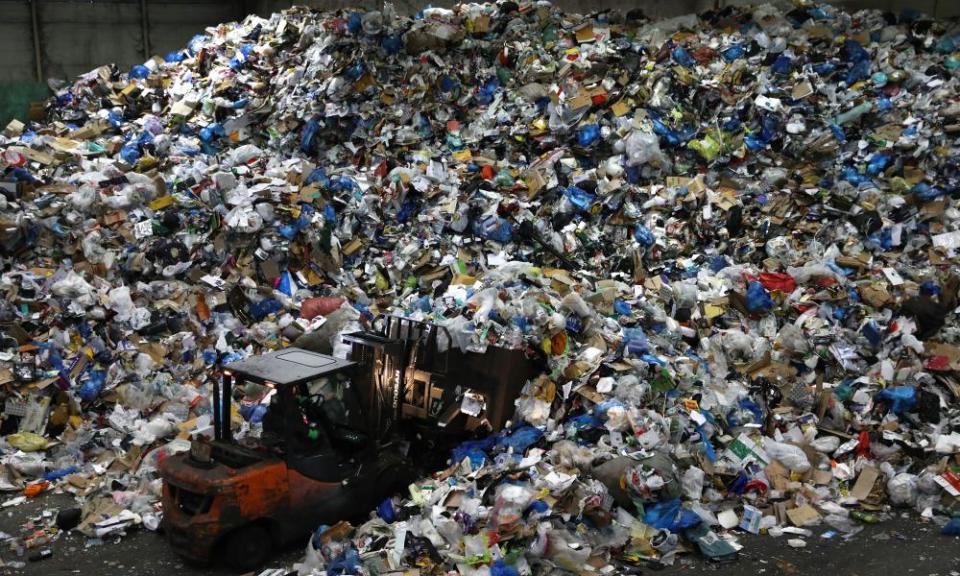NSW and WA in ‘race to the top’ to ban single-use plastics from next year

Lightweight plastic bags, disposable plastic straws and cutlery, plastic cotton buds and microbeads will be banned in New South Wales from next year, as part of a state government push to reduce plastic litter by 30% by 2025.
Reducing plastic waste is part of a wider $356m five-year plan from the NSW government that will also see a new “green” bin for food and organic waste rolled out to homes across the state by 2030 – something the state’s environment minister Matt Kean says will help reduce emissions in landfill and allow greater extraction of biogas from waste.
Hours after NSW unveiled its plan, it was upstaged by the Western Australian government, which announced plans to phase out many of the plastic items faster than NSW.
WA premier Mark McGowan said the state would fast track its original plan by four years to achieve its goals – some of which NSW is not due to meet until 2025.
Both NSW and WA’s plastics reduction plans have been praised by the World Wildlife Fund Australia as “race to the top” in waste measures and “a terrific outcome for the environment”.
Related: Plastic debris on remote islands raises temperatures by 2.5C and threatens turtle populations
However the group wants to see NSW’s phase out dates set for some categories of plastics brought forward, noting its newly announced targets mostly bring NSW into line with targets already announced by other states.
NSW’s phasing out of “problematic” single use plastics will largely be split into two waves.
Plastic straws, stirrers and cutlery, polystyrene cups, takeaway containers, cotton buds with plastic sticks and microbeads in personal and cosmetic products, will be phased out within 12 months of when the waste plan is legislated – something the government hopes to do “in the coming months”.
Lightweight plastic shopping bags will be phased out within six months of the legislation passing.
However, longer term targets have been set for a range of other single use plastic products.
Within three years, the government will review a plan to phase out heavyweight bags like those available for purchase at supermarkets, plastic cups and bowls including lids and fruit stickers.
Kean said exemptions will be available for people with disabilities or health needs that mean they rely on particular single-use plastics.
He said that without action, we are on track to see more plastic in the ocean than fish by 2050.
“The single-use items we are phasing out will stop an estimated 2.7bn items of plastic litter from ending up in our environment and waterways over the next 20 years,” Kean said.
Meanwhile, WA’s fast tracked plastics phase out will see single-use plastic bowls, cups, plates, cutlery, straws, stirrers, polystyrene food containers, thick plastic bags and helium balloon releases banished by 31 December this year – four years earlier than its initial 2025 target.
Takeaway coffee cups and lids, microbeads and plastic cotton buds will be phased out in WA by the end of 2022.
WA environment minister Amber-Jade Sanderson said that for most people, plastics bans “will only involve making small changes to our behaviour”, and that a Plastic Straws Working Group had been formed to ensure ongoing single use supplies for disability and aged care sectors.
Kate Noble, WWF Australia’s plastics policy manager, said both states’ announcements meant “Australia should be playing a leadership role” in curbing global plastics waste.
Noble said NSW’s announcement “is a really comprehensive plan”, but that in “a national context, NSW is very much catching up with other states”.
“This puts NSW in a really good position, it’s dealing with some of the most problematic plastics quickly,” Noble said.
However she stressed she would like to see the timelines to review the phase out of some plastics within three years to be brought forward, saying “there’s no reason why this can’t all be quite harmonised now that these targets have been agreed” – referencing the National Plastics Plan agreed to in April.
Research commissioned by the WWF found that 130,000 tonnes of plastic flows into Australia’s environment, including the ocean, each year.
The same research found that 8bn cigarette butts – a third of the 24bn smoked each year in Australia – leak into Australia’s environment including oceans each year.
As part of its waste plan, the NSW government will investigate ways to reduce this cigarette butt waste, including greater responsibility for tobacco companies – something Noble said other states should look to follow NSW’s lead on.
The other key element of NSW’s waste plan, announced before the state’s budget later this month, is a campaign to minimise food scrap waste.
Related: Australia's voluntary and state-based schemes are failing to enforce plastic targets
By 2030, councils across the state will have to provide a separate bin for food scraps to stop things such as leftover foods from entering general waste red bins headed for landfill.
Some councils in the state, including Inner West and Randwick, have already introduced food waste bins. When organic waste decomposes without oxygen in landfill, it generates methane, which has a significantly worse impact in the atmosphere than carbon emissions.
Supermarkets and hospitality businesses with the highest volumes of food waste will have to separate their organic waste by 2025.
An education campaign will be rolled out to provide households with information about how to properly dispose of their food and organic waste.
“We can’t keep sending our scraps to languish in landfill when there are huge opportunities to turn our trash into treasure,” Kean said.
“This will not only deliver on our commitment to achieve zero emissions from organics in landfill by 2030, but will also grow our economy by extracting more resources like biogas from our waste.”
NSW’s plastics plan follows a national meeting of environment ministers in April that agreed to phase out a range of single-use plastics by 2025.

 Yahoo Finance
Yahoo Finance 